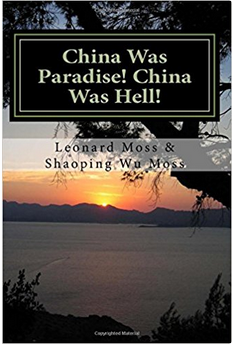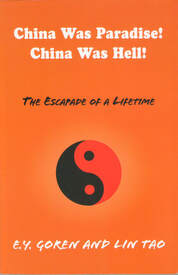China Was Paradise! China Was Hell!

Many books report the observations of American travelers in China, but this is not a travelogue, either in subject or style. How is it untypical?
1. It traces the belated education of a naïve American professor and the belated emancipation of an unconquerable Chinese woman. For the professor, the physical journey to strange new sights, food, people, and customs brings to climax a long-standing inner journey. His lifelong movement toward self-definition and rewarding relationships gets blocked by bureaucratic interference, but he is rejuvenated by the courage and good sense of his lover.
She contributes her own account of a grueling lifelong journey toward political liberation and a meaningful marriage.. But where he struggled to discharge internal baggage, she fought to protect her integrity from oppressive government mismanagement and obsolete cultural attitudes. He floundered, she rebelled. Their common enterprise: to affirm their mutual respect while coping with formidable obstacles.
So the narrators are middle-aged adults, not impetuous youngsters, and yet they are child-like and unsophisticated. They learn from experience rather than remain stereotypes. These grownups grow up!
2. They celebrate a meeting of cultures but do not merge their viewpoints in a single voice. Coming from different worlds, they do not always display the same reaction to problems and pleasures, and their differing speech habits reflect those differing outlooks. They join their lives but tell their tale in distinctive ways. They are equal but separate.
3. They do not shy away from strenuous political comment as they deal with prejudice and oppression. They deliver a critique of a bizarre, repressive bureaucracy that restricts and oppresses over a billion people. China turns out to be a mixed bag.
No, this memoir is definitely not a travelogue. It manages to be a romantic comedy, a political satire, a journey toward maturity, and (at the end) a tear-jerker. The narrators do not make their tale nice and tidy to fit a literary or commercial formula. They develop a serious theme about the trial of their maturing identities but at the same time uncover facts and feelings that are trivial, farcical, embarrassing, or contradictory. They reveal their own idiosyncrasies along with the virtues and vices of others. They even give vent to a few amateurish poems and a silly song.
They make only one departure from fact: they change the names of participants in order to protect their privacy, and they take pseudonyms to distance themselves from the events and to preserve the professor’s feeling of unreality that pervaded his escapade in a strange new world. “You will be living our fantasy,” a friend remarked when he left for Beijing.
The authors’ coming of age was matched by their Chinese friends. Beijing in the mid-eighties turned out to be a glorious time for deviating from the party line. The chaos of the Cultural Revolution had more or less ended in 1976, and the harassment that culminated in the slaughter of students and workers in 1989 had not yet escalated. Temporarily unleashed by the authorities, young men and young women were eager to experiment with their personal relations, their public status, and their work. It was a unique period in Chinese history, a brief interlude for sweet dreaming, for kindness and hope and playfulness and trust and self-respect, for the rebirth of the lovable child after centuries of tight government control.
This account is dedicated to the memory of that interlude, to the innocence and versatility and strength of China’s children.
Your comments are invited: [email protected].
First edition:
https://www.amazon.com/gp/product/141347196X/ref=dbs_a_def_rwt_bibl_vppi_i0
Last update: 5/2017
1. It traces the belated education of a naïve American professor and the belated emancipation of an unconquerable Chinese woman. For the professor, the physical journey to strange new sights, food, people, and customs brings to climax a long-standing inner journey. His lifelong movement toward self-definition and rewarding relationships gets blocked by bureaucratic interference, but he is rejuvenated by the courage and good sense of his lover.
She contributes her own account of a grueling lifelong journey toward political liberation and a meaningful marriage.. But where he struggled to discharge internal baggage, she fought to protect her integrity from oppressive government mismanagement and obsolete cultural attitudes. He floundered, she rebelled. Their common enterprise: to affirm their mutual respect while coping with formidable obstacles.
So the narrators are middle-aged adults, not impetuous youngsters, and yet they are child-like and unsophisticated. They learn from experience rather than remain stereotypes. These grownups grow up!
2. They celebrate a meeting of cultures but do not merge their viewpoints in a single voice. Coming from different worlds, they do not always display the same reaction to problems and pleasures, and their differing speech habits reflect those differing outlooks. They join their lives but tell their tale in distinctive ways. They are equal but separate.
3. They do not shy away from strenuous political comment as they deal with prejudice and oppression. They deliver a critique of a bizarre, repressive bureaucracy that restricts and oppresses over a billion people. China turns out to be a mixed bag.
No, this memoir is definitely not a travelogue. It manages to be a romantic comedy, a political satire, a journey toward maturity, and (at the end) a tear-jerker. The narrators do not make their tale nice and tidy to fit a literary or commercial formula. They develop a serious theme about the trial of their maturing identities but at the same time uncover facts and feelings that are trivial, farcical, embarrassing, or contradictory. They reveal their own idiosyncrasies along with the virtues and vices of others. They even give vent to a few amateurish poems and a silly song.
They make only one departure from fact: they change the names of participants in order to protect their privacy, and they take pseudonyms to distance themselves from the events and to preserve the professor’s feeling of unreality that pervaded his escapade in a strange new world. “You will be living our fantasy,” a friend remarked when he left for Beijing.
The authors’ coming of age was matched by their Chinese friends. Beijing in the mid-eighties turned out to be a glorious time for deviating from the party line. The chaos of the Cultural Revolution had more or less ended in 1976, and the harassment that culminated in the slaughter of students and workers in 1989 had not yet escalated. Temporarily unleashed by the authorities, young men and young women were eager to experiment with their personal relations, their public status, and their work. It was a unique period in Chinese history, a brief interlude for sweet dreaming, for kindness and hope and playfulness and trust and self-respect, for the rebirth of the lovable child after centuries of tight government control.
This account is dedicated to the memory of that interlude, to the innocence and versatility and strength of China’s children.
Your comments are invited: [email protected].
First edition:
https://www.amazon.com/gp/product/141347196X/ref=dbs_a_def_rwt_bibl_vppi_i0
Last update: 5/2017

This is the first edition of China Was Paradise! China Was Heill, publishedfin 2005.
